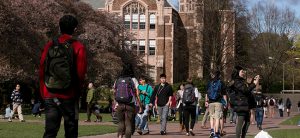Protecting access to justice in the Civil Rights & Judiciary Committee
Before coming to Olympia, I was a member of the Bellevue School Board. As a school director, it was my responsibility to make sure that the only job our students had was to focus on education. We worked to make sure that no matter what challenges students faced outside of school – whether they were experiencing homelessness, had a history of trauma, or regularly came to school hungry – they had access to the opportunity to learn.
I take that approach with my work on the Civil Rights and Judiciary Committee, on which I am the Vice Chair. Everything we do ensures that people have equal access to opportunity and justice.
 One of my bills, Substitute House Bill 2567, would prevent immigration officials from arresting people in courthouses. Much like school is a sacred place for students to learn, courts are a sacred place where people seek justice. People go to court for all kinds of reasons – to seek protection orders, to serve as witnesses, or to plead their innocence. If courthouses become dangerous for undocumented people, they lose their fundamental right of access to our justice system.
One of my bills, Substitute House Bill 2567, would prevent immigration officials from arresting people in courthouses. Much like school is a sacred place for students to learn, courts are a sacred place where people seek justice. People go to court for all kinds of reasons – to seek protection orders, to serve as witnesses, or to plead their innocence. If courthouses become dangerous for undocumented people, they lose their fundamental right of access to our justice system.
I am also working on two bills that would protect people who are renters from unjust evictions and unfair wear and tear fees. Evictions are a triggering event for causing people to become homeless, and losing a damage deposit can put people into debt and make it difficult to find and keep new housing. This leads to instability for families and makes it even harder for students to have equal access to opportunity.
House Bill 2453 protects people from being unjustly evicted. We know that in places where strong protections for tenants exist, eviction rates are lower. This means more stability for renters and a lower risk of ending up homeless because of an eviction.
House Bill 2520 establishes a balance between landlords and tenants regarding damage deposits. Tenants often find themselves in the position of paying for things that are beyond their useful life, and they have little recourse but to pay or have their rental or credit history ruined. This bill allows wear and tear fees to be paid through full and specific documentation of the costs of repairs at the end of tenancy.
Under these bills, those who provide affordable housing will continue to have recourse to evict people or charge damage deposits for legitimate business reasons, but renters will also have fair treatment. Most landlords want to do the right thing, and this creates a process for landlords to work in good faith with their tenants towards a fair system.
 Seeing the benefits of the Washington Education Investment Act
Seeing the benefits of the Washington Education Investment Act
In 2019, the Legislature passed the Workforce Education Investment Act, which invests in our students to meet the needs of a 21st century economy. With House Bill 2158, we expanded and fully funded the Washington College Grant (renamed from State Need Grant), providing free public college tuition for families making up to 55 percent of state median income ($50,000 per year in 2019 for a family of four) and partial assistance to families making up to 100 percent of state median income ($92,000 per year).
 Before passing this bill, the State Need Grant did not cover all eligible students. In the 41st district, in the 2018-19 school year there was a gap of 297 students who were eligible but did not receive funding. This year, that gap will disappear.
Before passing this bill, the State Need Grant did not cover all eligible students. In the 41st district, in the 2018-19 school year there was a gap of 297 students who were eligible but did not receive funding. This year, that gap will disappear.
The legislation also increased capacity for high-demand degrees like computer science, engineering and nursing; funded community and technical college programs and apprenticeships; expanded enrollment at the Washington State University Medical School; and provided Working Connections Child Care for working parents.
The best part of serving you in the Legislature is being able to see the impact of our policies on ordinary people. This week, a group of students came to Olympia to speak to me about the Washington College Grant and how it has changed their lives. Not only are they able to make their dreams of higher education come true, but they are able to do so without being buried under debt when they are done.
Policy Committee Cutoff
Friday, February 7 is Policy Committee Cutoff. Here in Olympia, every bill starts out in a committee, where we have a hearing and a vote before a bill can advance. Today’s deadline means that any bill that does not get voted on in its original policy committee by the end of the day is considered dead for this session.
Bills still have until next Tuesday to be voted on if they are in a fiscal committee, which include Appropriations, Capital Budget, Finance, and Transportation. After that, there is a week for House bills to receive a vote on the House floor.
This helps us narrow the field of bills we are still working on as we get closer to the end of session. After this we will consider Senate bills that made it through the whole committee and floor process in that chamber. Some House bills that did not make it through the process before the deadline have companion bills in the Senate which are identical or very similar. If the companion bill is still moving, it means that the policy has another opportunity to make it through this legislative session.
It is an honor to represent you. Please don’t hesitate to contact me with your questions, comments or concerns.

Rep. My-Linh Thai
